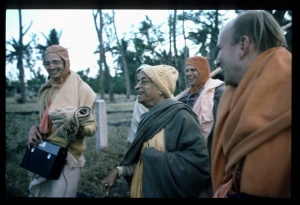CC Antya 3.192 (1975): Difference between revisions
(Vanibot #0027: CCMirror - Mirror CC's 1996 edition to form a basis for 1975) |
(Vanibot #0020: VersionCompareLinker - added a link to the Version Compare feature) |
||
| Line 2: | Line 2: | ||
<div style="float:left">'''[[Sri Caitanya-caritamrta (1975)|Śrī Caitanya-caritāmṛta (1975)]] - [[CC Antya (1975)|Antya-līlā]] - [[CC Antya 3 (1975)|Chapter 3: The Glories of Śrīla Haridāsa Ṭhākura]]'''</div> | <div style="float:left">'''[[Sri Caitanya-caritamrta (1975)|Śrī Caitanya-caritāmṛta (1975)]] - [[CC Antya (1975)|Antya-līlā]] - [[CC Antya 3 (1975)|Chapter 3: The Glories of Śrīla Haridāsa Ṭhākura]]'''</div> | ||
<div style="float:right">[[File:Go-previous.png|link=CC Antya 3.191 (1975)|Antya-līlā 3.191]] '''[[CC Antya 3.191 (1975)|Antya-līlā 3.191]] - [[CC Antya 3.193 (1975)|Antya-līlā 3.193]]''' [[File:Go-next.png|link=CC Antya 3.193 (1975)|Antya-līlā 3.193]]</div> | <div style="float:right">[[File:Go-previous.png|link=CC Antya 3.191 (1975)|Antya-līlā 3.191]] '''[[CC Antya 3.191 (1975)|Antya-līlā 3.191]] - [[CC Antya 3.193 (1975)|Antya-līlā 3.193]]''' [[File:Go-next.png|link=CC Antya 3.193 (1975)|Antya-līlā 3.193]]</div> | ||
{{CompareVersions|CC|Antya 3.192|CC 1975|CC 1996}} | |||
{{RandomImage}} | {{RandomImage}} | ||
==== TEXT 192 ==== | ==== TEXT 192 ==== | ||
| Line 11: | Line 10: | ||
<div class="verse"> | <div class="verse"> | ||
:parama-sundara, paṇḍita, nūtana-yauvana | :parama-sundara, paṇḍita, nūtana-yauvana | ||
:nāmābhāse | :nāmābhāse 'mukti' śuni' nā ha-ila sahana | ||
</div> | </div> | ||
| Line 18: | Line 17: | ||
<div class="synonyms"> | <div class="synonyms"> | ||
parama-sundara—very beautiful; paṇḍita—learned; nūtana—new; yauvana—youth; nāma-ābhāse—by the glimpse of awakening of pure chanting of the holy name; mukti—liberation; | parama-sundara—very beautiful; paṇḍita—learned; nūtana—new; yauvana—youth; nāma-ābhāse—by the glimpse of awakening of pure chanting of the holy name; mukti—liberation; śuni'-hearing; nā ha-ila sahana—could not tolerate. | ||
</div> | </div> | ||
| Line 25: | Line 24: | ||
<div class="translation"> | <div class="translation"> | ||
He had handsome bodily features, and he was learned and youthful, but he could not tolerate the statement that simply by glimpsing the awakening of the | He had handsome bodily features, and he was learned and youthful, but he could not tolerate the statement that simply by glimpsing the awakening of the Lord's holy name one can attain liberation. | ||
</div> | </div> | ||
| Line 32: | Line 31: | ||
<div class="purport"> | <div class="purport"> | ||
Vaiṣṇavas strictly follow the directions of the śāstras regarding how one can be liberated simply by a slight awakening of pure chanting of the holy name. Māyāvādīs cannot tolerate the statements of the śāstras about how easily liberation can be achieved, for | Vaiṣṇavas strictly follow the directions of the śāstras regarding how one can be liberated simply by a slight awakening of pure chanting of the holy name. Māyāvādīs cannot tolerate the statements of the śāstras about how easily liberation can be achieved, for as stated in Bhagavad-gītā ([[BG 12.5 (1972)|BG 12.5]]), kleśo 'dhikataras teṣām avyaktāsakta-cetasām: impersonalists must work hard for many, many births, and only then will they perhaps be liberated. Vaiṣṇavas know that simply by chanting the holy name of the Lord offenselessly, one achieves liberation as a by-product. Thus there is no need to endeavor separately for liberation. Śrīla Bilvamaṅgala Ṭhākura has said, muktiḥ svayaṁ mukulitāñjali sevate 'smān: liberation stands at one's door, ready to render any kind of service, if one is a pure devotee with unflinching faith and reverence. This the Māyāvādīs cannot tolerate. Therefore the ārindā pradhāna, chief tax collector, although very learned, handsome and youthful, could not tolerate the statements of Haridāsa Ṭhākura | ||
</div> | </div> | ||
Latest revision as of 01:12, 27 January 2020

A.C. Bhaktivedanta Swami Prabhupada
TEXT 192
- parama-sundara, paṇḍita, nūtana-yauvana
- nāmābhāse 'mukti' śuni' nā ha-ila sahana
SYNONYMS
parama-sundara—very beautiful; paṇḍita—learned; nūtana—new; yauvana—youth; nāma-ābhāse—by the glimpse of awakening of pure chanting of the holy name; mukti—liberation; śuni'-hearing; nā ha-ila sahana—could not tolerate.
TRANSLATION
He had handsome bodily features, and he was learned and youthful, but he could not tolerate the statement that simply by glimpsing the awakening of the Lord's holy name one can attain liberation.
PURPORT
Vaiṣṇavas strictly follow the directions of the śāstras regarding how one can be liberated simply by a slight awakening of pure chanting of the holy name. Māyāvādīs cannot tolerate the statements of the śāstras about how easily liberation can be achieved, for as stated in Bhagavad-gītā (BG 12.5), kleśo 'dhikataras teṣām avyaktāsakta-cetasām: impersonalists must work hard for many, many births, and only then will they perhaps be liberated. Vaiṣṇavas know that simply by chanting the holy name of the Lord offenselessly, one achieves liberation as a by-product. Thus there is no need to endeavor separately for liberation. Śrīla Bilvamaṅgala Ṭhākura has said, muktiḥ svayaṁ mukulitāñjali sevate 'smān: liberation stands at one's door, ready to render any kind of service, if one is a pure devotee with unflinching faith and reverence. This the Māyāvādīs cannot tolerate. Therefore the ārindā pradhāna, chief tax collector, although very learned, handsome and youthful, could not tolerate the statements of Haridāsa Ṭhākura